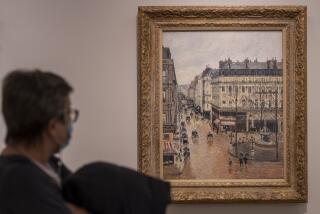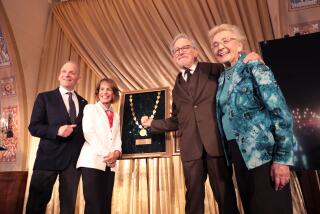Schoenberg Heirs Plan to Take Collection From USC : Music: Move would end long feud over the composer’s archives. Family seeks a new home for the materials.
- Share via
The family of composer Arnold Schoenberg plans to pull the world-renowned collection of his scores, artifacts and papers from its home at USC, bitterly ending a feud between the school and the heirs of the towering figure of 20th-Century arts.
“Were the collection to leave there, it would deal a real blow to the cultural life of Southern California and the university,” said Walter Frisch, a Schoenberg scholar and chairman of Columbia University’s music department. He described the archives as “certainly one of the greatest collections in the world” of music, an assessment shared by other experts.
Since 1977, Schoenberg’s enormous holdings of music, writings, concert programs, tapes and even his desk and piano have been kept in their own USC building, an international magnet for scholars. A long squabble over control of that building and archive copyrights recently reached a breaking point, both sides say, and Schoenberg’s children are seeking another university or library to house the collection.
Scholars around the nation are dismayed by the archive’s likely move out of Southern California, where Schoenberg had strong ties. After escaping Nazism, the Viennese-born inventor of 12-tone music lived in Los Angeles for 17 years, until his death in 1951 at age 76. He taught at UCLA and USC while continuing to write atonal music that partisans praised as revolutionary and skeptics found unlistenable.
In interviews, the Schoenbergs have stressed that they have no intention of selling or breaking up the collection, which was appraised 20 years ago at about $3 million and is now thought to be worth much more. Several out-of-state universities and libraries reportedly want the archives, but the heirs declined to identify those sites or say when the move might occur.
The dispute partly involves the 200-seat recital hall inside the Schoenberg Institute building. In the original contract that awarded the collection to USC, that hall was supposed to be used only for performances of--or lectures about--Schoenberg’s music and that of other modernists. Citing academic freedom and a campus space crunch, school officials contend that they no longer can limit use of the hall. USC pays more than $300,000 a year for the salaries of five institute employees and the building’s maintenance.
In addition, the Schoenbergs say the university ignores program suggestions and refuses to convene the institute’s advisory board, on which the family holds three of seven seats. The squabble extends to the question of who should grant authors copyright permissions.
Claudio Spies, a music professor at Princeton University, declared: “The importance of that collection could not be overstated. It is extremely important that it continue to be housed as it has been housed. . . . It is unthinkable that it be used as part of some ridiculous squabble.”
While some observers think a last-minute compromise remains possible, participants say the break is irreparable.
“There is no reason to expect or think that any reconciliation could occur,” said Lawrence Schoenberg of Pacific Palisades, youngest of the composer’s three surviving children.
“It is with with no joy that we see it go, but I think it is perhaps inevitable with the differences of opinion,” said USC Provost Lloyd Armstrong Jr., who likened the situation to the end of a long marriage. He added that he sympathized with “the desires of the heirs to find a place that is more philosophically in tune . . . much as we feel bad about it going.”
The collection includes about 6,000 pages of music, drawings and writings; 2,000 published volumes of music and books; many diaries, calendars and photographs; all the furniture from Schoenberg’s Brentwood study, and recordings of many compositions that scholars say had immense influence worldwide. Although many Schoenberg letters are at the Library of Congress, the breadth of the USC holdings is very rare among music libraries.
Located on the northwest side of USC’s campus, the two-story Schoenberg Institute is a concrete-and-glass structure whose modernist design is supposed to evoke the composer’s music, which threw out classical harmonies and outraged traditionalists. In a sign of Schoenberg’s stature, the West Berlin government donated money to USC for the institute’s furnishings and equipment.
In a first-floor, high-security room, the temperature is kept at 65 degrees Fahrenheit and the humidity at 62% to protect such items as Schoenberg’s original 1903 score--in his slanted black-ink handwriting--of the tone poem “Pelleas und Melisande.”
Among other things, the tall steel shelves contain Schoenberg’s handwritten score of his unfinished 1930s opera “Moses und Aron”; a copy of Thomas Mann’s novel “Doktor Faustus” inscribed to Schoenberg and signed by the author; an original program from a 1902 performance in Vienna of Schoenberg’s “Verklaerte Nacht,” or “Transfigured Night”; a copy of his influential book “Theory of Harmony,” inscribed in German in 1924 to his second wife “ Meine Liebste “ (my love) by “ dein (your) Arnold .” His volumes of Goethe, Shakespeare and Nietzsche are also there, annotated in his fraktur, the antique Gothic-style handwriting.
“Anyone serious about doing Schoenberg research is going to make contact with us,” said R. Wayne Shoaf, the institute’s archivist. He estimated that several hundred published books “wouldn’t exist without the resources we’ve provided.”
On the second floor, behind a glass pane, Schoenberg’s Brentwood study is recreated with the original furniture, lamps, pens and his upright piano. Just behind is the recital hall, which has been rarely used in recent years since the family complained about violation of its booking rules.
“The fundamental disagreement is over the single focus, the memorializing of Schoenberg to the exclusion of studies of other 20th-Century music or other emigre studies,” said Lynn Sipe, the acting director of USC’s libraries.
USC also wants more control over the archives’ copyrights, which the family retains. Provost Armstrong called the current copyright arrangement “not consistent with our standards of academic freedom” because the family holds ultimate power over the material’s use.
The Schoenbergs stress that they have never denied a scholar the right to quote or reproduce anything for free, a point several scholars confirmed. USC’s efforts now show disrespect to the artistic legacy, the heirs maintain.
“It’s astonishing; it’s very painful to hear them say we are infringing on their academic freedom,” said Lawrence Schoenberg.
Some observers liken the situation to the controversy that arose in March when Yale University returned a $20-million gift from Texas financier and alumnus Lee M. Bass because he wanted to approve faculty appointments to a Western civilization study program he funded. The crucial difference, Schoenberg supporters stress, is that USC is attempting to break a two-decade-old agreement that the university eagerly sought.
Others say the feud mirrors Schoenberg’s feeling that he was never recognized or rewarded enough in his lifetime. They cite his rejected application for a 1945 Guggenheim Fellowship.
“The squabbles have gone on and on and on,” said one person who is knowledgeable about the USC debate and who requested anonymity. “Neither side wants to back down because it’s a matter of pride. Who wants to lose and who wants to have their nose shoved in the dirt?”
It may be difficult to find another library that will agree to similar restrictions and care for the collection as well as USC has, some scholars suggested. Initial response from outside California proves otherwise, the Schoenbergs contend.
“It is nice to have it (nearby) but it is nice to have it appreciated,” explained the composer’s other son, Ronald Schoenberg, who is a Los Angeles municipal judge.
USC leaders say the school will retain much of the collection’s intellectual value by keeping microfilm and other copies as well as the many books acquired without the family’s help. However, the school has not determined future use of the building and whether the Schoenberg name will stay on it.
“I hope the institute will continue to exist,” said its director, USC music professor Paul Zukofsky. “The (remaining) material will certainly be utilized. How, exactly? At this point, nobody knows. This will take time.”
More to Read
The biggest entertainment stories
Get our big stories about Hollywood, film, television, music, arts, culture and more right in your inbox as soon as they publish.
You may occasionally receive promotional content from the Los Angeles Times.











